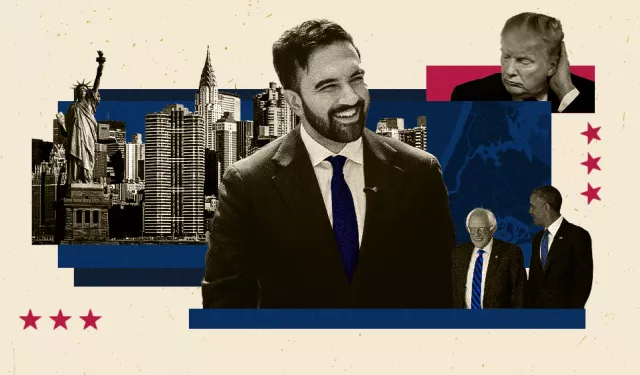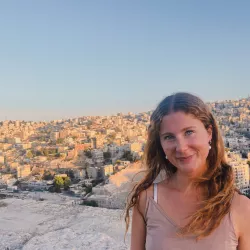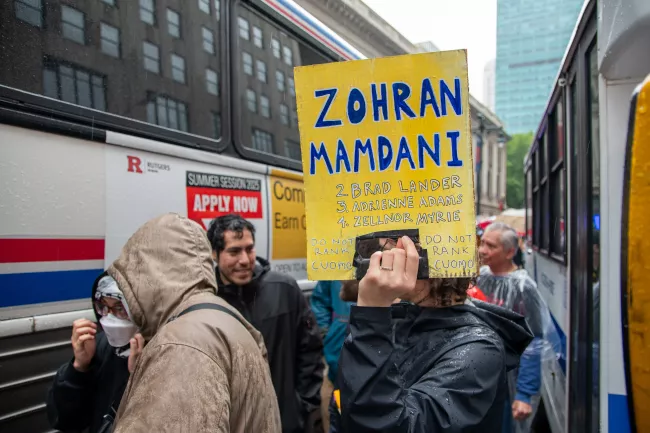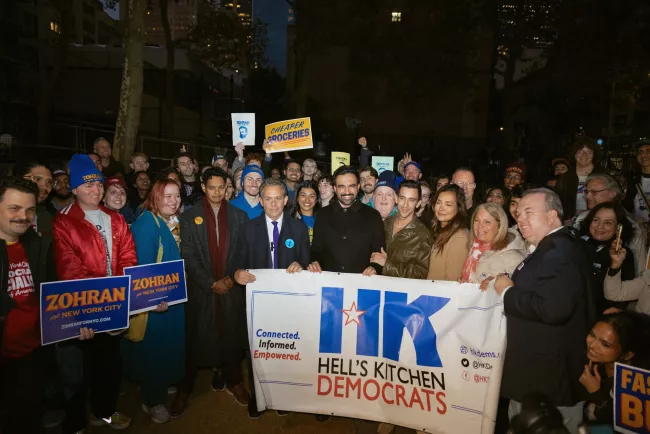
Mamdani wins New York: A mayor who won’t apologize for being radical
The political landscape of America’s largest city has shifted with New York City’s election of a 34-year-old Muslim democratic socialist whose radical politics leave little room for apology.
Zohran Mamdani, born in Uganda to parents of Indian origin, won the mayoral race in a city long seen as the epicenter of global capitalism.
His victory breaks with NY’s long tradition of electing white, business-backed politicians. This symbolic win for the American left and a reminder that far-reaching economic reforms remain possible may signal an ideological shift inside the Democratic Party.
“I am young, despite my best efforts to grow older. I am Muslim. I am a democratic socialist. And most damning of all, I refuse to apologize for any of this”
Caution tempers the optimism when big donors, party leaders, and national figures are already lining up to blunt his agenda.
For the American left, this is a moment of opportunity that also demands care. Whether Mamdani can carry out his plans will determine if this is a turning point for Democrats or merely a brief high point for socialism.
For now, the win proves that organizing among the city’s working-class and immigrant communities can still reach the top of municipal power. The test now is governing.
Over decades, anti-capitalist candidates in and beyond the US have hit a wall of resistance. Bernie Sanders, Jeremy Corbyn, and Alexis Tsipras all rose on democratic-socialist promises, only to face coordinated opposition from party establishments, major funders, and national media—on top of hard economic headwinds.
How inflation voted for Mamdani
Mamdani is NYC’s first democratic socialist mayor. On the campaign trail, he challenged the Democratic Party’s centrist wing and criticized its dependence on big donors.
Andrew Cuomo, the city’s former Democratic mayor, ran as an independent after losing the Democratic nomination to Mamdani. He called the election a “civil war” within the party, casting himself as the defender of moderates against surging progressives. Voters chose change.
NYC has long embodied neoliberal policy, privatizing public services and shrinking the state’s economic role.
The spike in inflation across the US in 2022 after the COVID-19 pandemic has squeezed living costs, and despite the Federal Reserve’s intervention, inflation remains high by historical standards.
Against that backdrop, Mamdani’s economic program leans on public provision; offering key services either at cost or for free.
The policies he pitched should sound familiar to many in Egypt from the days before neoliberal orthodoxy took hold in the 1990s: state-run stores selling subsidized goods, rent controls, and fare free buses.
He has pledged to expand free childcare for all children from six weeks to five years old, building on existing programs but universalizing them across the city.
On housing, he calls current rent-stabilization rules inadequate and proposes an outright rent freeze. His plan combines that freeze with incentives to accelerate construction of low-cost housing to expand supply and relieve pressure on tenants.
He summed up his social vision in his victory speech: “A life of dignity should not be reserved for a fortunate few. It should be one that city government guarantees for each and every New Yorker.”
Follow the money
Mamdani’s biggest fights will likely come over who pays for his promises. He plans to raise the corporate tax rate to 11.5% and add a two-point surcharge for individuals earning over $1 million a year.
At the other end of the scale, he aims to lift the city’s minimum wage gradually from today’s $16.50 an hour to $30 by 2030.
The city’s financial elite fought hard to stop him. In the run-up to the vote, more than 20 billionaires poured in tens of millions of dollars through massive super PACs to sink his bid.
Michael Bloomberg alone spent $13.3 million in total to boost Cuomo, while Ronald Lauder, heir to Estée Lauder, contributed about $1 million.
Turn up the volume, Trump
Mamdani did not deny—or apologize for—the threat he posed to entrenched interests. He embraced it on the stump: “They say we pose an existential threat... They are right. We are an existential threat to billionaires who think their money can buy our democracy.”
That threat extends beyond redistributive policy. He also tapped the energy of minority communities long sidelined in formal politics.
As Donald Trump escalates hostile rhetoric and policies against immigrants, Mamdani’s campaign centered migrant communities, running ads in Urdu, Spanish and Arabic.
In his victory speech, he greeted supporters in Arabic “I am one of you, and I am here for you”, before naming the groups he promised to represent: “Yemeni bodega owners and Mexican abuelas. Senegalese taxi drivers and Uzbek nurses. Trinidadian line cooks and Ethiopian aunties.”
While the traditional political class condemned student and mass mobilizations backing Palestinians during two years of Israeli genocide in Gaza, Mamdani—who supported pro-Palestine campus activism during his years at Bowdoin College in Maine—sided with the movement.
That stance energized young people and voters disillusioned with the Democratic Party’s pro-Israel line, helping fuel his rise.
The mayor-elect has been blunt, accusing Israel of “genocide” and pledging to arrest Prime Minister Benjamin Netanyahu if he visits NY in compliance with International Criminal Court warrants.
That, in turn, made Mamdani a Republican target nationally. Trump has repeatedly labeled him a “communist” and threatened to cut federal funding to NY if he wins. Mamdani answered on election night: “After all, if anyone can show a nation betrayed by Donald Trump how to defeat him, it is the city that gave rise to him... So, Donald Trump, since I know you’re watching, I have four words for you: Turn the volume up.”
Can he pull it off?
Even so, ballot-box wins don’t guarantee governing success. Sanders, Corbyn and Tsipras all faced institutional pushback that blunted their programs.
Mamdani is on a similar path, confronting party leaders and powerful financial interests. Challenges stack up, starting with his fraught relationship with Trump, and Mamdani’s description of the president’s “fascism.”
Beyond the White House feud, NY’s new mayor cannot unilaterally enact everything he proposes. Much of his agenda requires legislation or action by officials outside his direct authority.
Time magazine has pointed to multiple former NY mayors who failed to push through tax hikes because they couldn’t win over lawmakers, including billionaire Michael Bloomberg who led the city in the early 2000s, and Bill de Blasio, who served from 2014 to 2021.
Housing policy is also hotly debated. Mamdani wants an immediate rent freeze. Critics warn that such a move merely postpones the crisis. By the end of his term, the next administration could face rents far out of step with inflation and feel compelled to spike them to “catch up.” Others argue strict limits on rent will chill developers’ appetite to build new housing.
Even amid obstacles, he sounds undeterred. “The conventional wisdom would tell you that I am far from the perfect candidate,” he said after his win. “I am young, despite my best efforts to grow older. I am Muslim. I am a democratic socialist. And most damning of all, I refuse to apologize for any of this.”



